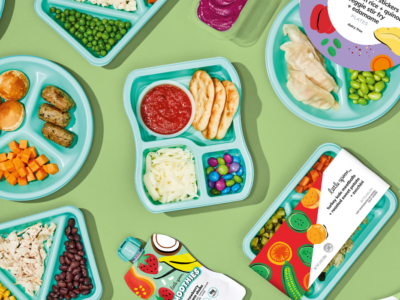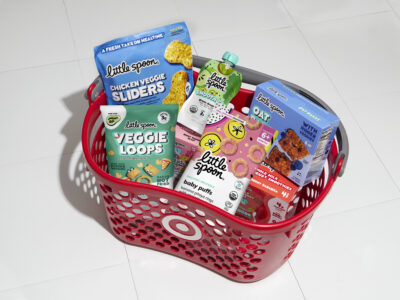One of the greatest gifts my parents gave me was the joy of gathering for family meals. My siblings and I would come home from school to find dinner ready, lovingly prepared by my mom. At the time, it just felt normal (and, of course, delicious). Now, as both a mom and a pediatric dietitian, I realize what a powerful gift those meals really were—for my health, my happiness and my relationship with food.
Fast-forward to today, and the benefits of family meals are just as strong, though they may look a little different. Between after-school activities, homework, and the general busyness of modern life, sitting down together as a family can feel impossible. But that time around the table is worth protecting, which is why in our house, it’s become a non-negotiable.
Read on to learn more about the benefits of family meals, practical ways to make them happen in your home and how they can help kids build a healthier relationship with food.
What are family meals?
Simply put, family meals are when everyone in the household sits down together to eat. For many families, this doesn’t happen three times a day—it usually happens once, most often at dinner after school, work, errands and activities are wrapped up. But it doesn’t have to be dinner. If your kids are little and not in school yet or you homeschool, breakfast or lunch might work better for your family. The point isn’t which meal you share, it’s about coming together around the table to eat.
3 benefits of family meals.
For some families, sitting down together for a meal feels completely manageable. For others, it can feel almost impossible. In households where both parents work late or have evening shifts, just getting dinner on the table can be a challenge—let alone coordinating everyone’s schedules. I get it, it’s tough. That’s why in this section, I’ll first highlight the benefits of family meals and then share practical tips to help make them a reality in your home.
1. Models healthy eating
When families eat together, children get a front-row seat to how their parents approach food. This is a powerful opportunity to model healthy eating habits, like filling a plate with a balanced variety of food groups, eating at a comfortable pace and enjoying each bite. Kids are like little sponges, soaking up what they see, so when they watch parents savor their meals, try new foods and pay attention to hunger and fullness cues, they’re learning how to build a positive, lifelong relationship with food.
2. Supports mental health
Research shows that family meals can lower the rates of depression and stress and improve self-esteem. If you think about it, sharing meals provides a natural opportunity for family members to communicate, connect and bond.
Interestingly, family meals may also benefit parents. Mealtime offers a chance to catch up, laugh, divvy up household tasks and enjoy quality time with the people you love most.
3. Helps with weight management
Obesity affects about 1 in 5 children in the U.S., and it can increase the risk of serious health issues like type 2 diabetes, heart disease, certain cancers and problems with bone health and reproduction. It can also impact daily living, like sleep, movement and overall quality of life. Fortunately, family meals can help.
Research across 43 countries found that children and adolescents who eat with their families more often are less likely to have excess weight or obesity. One reason is that parents act as nutritional “gatekeepers,” guiding children’s eating habits and modeling healthy choices. The study also suggests several other ways family meals support healthy weight management:
- Positive social environment: Sharing meals fosters emotional and social connections that can reduce stress and anxiety, which are factors often linked to unhealthy eating and weight gain.
- Portion control and structure: Family meals usually involve structured mealtimes and balanced portions, preventing overeating or binge eating.
- Healthier food choices: Meals prepared at home tend to be more nutritious than fast food or highly processed options. This helps children avoid excess calories and low-nutrient foods.
So, how do we actually get everyone around the table?
Great question, and it’s not always easy. Between sports practices, homework, late work shifts and endless to-do lists, family meals don’t just magically happen. They usually take some planning and prioritizing. Sometimes that might mean saying “no” to an extra after-school activity, adjusting the dinnertime hour, or getting creative with which meal you share (maybe breakfast or weekend lunch works better for your family). Here are some ways to make it work:
Perfection isn’t the goal
Having family dinners every single night sounds great, but for most families, it’s just not realistic. Aim for most days of the week, and remember that weekends often provide a little extra breathing room to sit down together. If that means you share dinner three nights during the week and then both Saturday and Sunday, you’re already creating a powerful routine. And if two nights a week work better, that’s still valuable. Small moments around the table add up and can have a big impact on your family’s health and connection. Plus, what matters most is consistency, not perfection.
Cut yourself some slack
Family meals don’t mean you need to slave in the kitchen for five hours for an elaborate five-course dinner. Simple, quick meals absolutely count, whether that’s sandwiches, breakfast-for-dinner or leaning on nutritious, ready-made options. The magic happens when everyone’s at the table together, not in how fancy the food looks. Here are a few of my go-to meals that make shared meals easier, less stressful and more enjoyable:
- Toast, scrambled eggs, sliced vegetables
- Chickpea pasta with tomato sauce, cheese and peas
- Little Spoon purees for the baby
- Greek yogurt Smoothie pouches (4-packs available at Target!), chia seeds + berry yogurt bowls and whole grain cereal
- Turkey and cheese roll up with sliced bell peppers
- Cheese and bean quesadilla with guacamole and cucumber slices
- Baked ziti
- Little Spoon Super Chicken Dippers (family-size bags at Target!), brown rice, steamed broccoli
Embrace menu planning
I used to roll my eyes at the idea of menu planning. I thought I didn’t need it, but boy, was I wrong. Once I gave it a try, I never looked back. Menu planning is exactly what it sounds like— choosing your meals ahead of time. For me, that means sitting down on Saturday night and writing out what we’ll have for dinner each evening of the week (though you can plan breakfasts or lunches, too). It guides my grocery shopping, keeps everyone in the loop and helps me manage my day by knowing how much time I’ll need to cook.
When dinner plans don’t line up
Sometimes life happens, and your kids are hungry and ready for dinner, but you’ve got a date night planned, a dinner with friends or maybe you didn’t manage to get a meal on the table in time. It happens to all of us, and it’s totally normal.
That’s where a little backup planning comes in handy. Having kid-friendly meals stocked in the freezer can be a lifesaver on nights like these. Whether it’s leftovers or a stash of nutritious Little Spoon Plates or a pack of Mini Turkey Kale Meatballs in the freezer, keeping simple, ready-made options on hand takes the stress out of “off nights.” Kids still get a balanced meal, you avoid last-minute scrambling and everyone leaves the table happy (and fed!).
Make meals fun
Family meals don’t have to be stiff or overly formal. They’re a chance to enjoy each other’s company, share stories from your day, laugh, and even be a little silly. Try themed dinners, cut sandwiches or pancakes into fun shapes or let everyone build their own topping combinations on pasta or tacos. The goal isn’t gourmet food—it’s making mealtime playful and positive, so kids can’t wait to sit down.
Family meals matter
Family meals are a chance to connect, build healthy habits and create lasting (and yummy!) memories. Even in the chaos of a busy week, carving out time for a few shared meals can make a big difference. The goal is showing up, keeping it consistent and turning mealtime into a positive, feel-good experience for the whole family.



